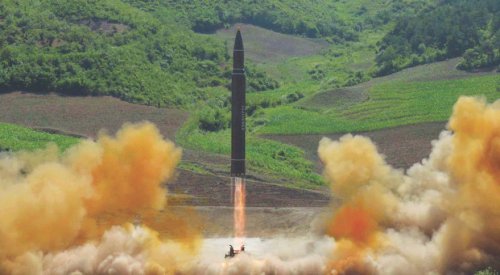MOSCOW – One week after Ukrainian President Petro Poroshenko ordered his government to investigate claims that North Korea may have procured rocket engines from a Ukrainian missile enterprise, the working group came back with an unambiguous answer: “Ukraine was not involved in the development of North Korea’s ballistic missiles program.”
In a 1,300-word letter addressed to Poroshenko Tuesday, the Secretary of Ukraine’s National Security and Defense Council (NSDC) Oleksandr Turchynov laid out his government’s defense against a controversial New York Times story published last week. That story heavily referenced a report by Michael Elleman of the International Institute of Strategic Studies.
In particular, Turchynov’s letter addressed head-on the possibility that Ukraine’s Yuzhmash rocket company – which built Zenit rockets for Sea Launch and components for Orbital ATK’s Antares rockets – was involved in the transfer of Soviet-era RD-250 rocket engines to North Korea for use in the new Hwasong-12 and Hwasong-14 ballistic missiles tested this summer.
Turchynov wrote that Ukraine’s existing export-control mechanisms are sufficient for preventing the transfer of military and dual-use goods to countries sanctioned by the UN Security Council.
“During the period of Ukraine’s independence [since 1991], the State Service of Export Control has never issued the permission for the supplying [North Korea] with any military and dual-use goods, including the RD-250 missile engines, its modifications and their components,” Turchynov wrote in the letter, which was published on the NSDC’s website.
The letter explained that Yuzhmash, and its R&D wing – the Yuzhnoe design bureau – were not the creators of the RD-250 engine. Rather, the design’s origins trace back to Russia’s Energomash, which builds the RD-180 for ULA’s Atlas 5rockets.
“In 1965, [Energomash] transferred documentation required for the organization of serial production of these engines to [Yuzhmash],” Turchynov wrote. “All rocket engines suitable for flight use, including the RD-250 engine and its modifications, were delivered from Yuzhmash to [Russia], only as part of missiles.”
Yuzhmash’s RD-250s were used in the R-36 (SS-9 Scarp) ICBMs and their peacetime conversions, the Tsyklon-2 and Tsyklon-3 launch vehicles, the letter explained. Modifications of the RD-250 for second-stage and high-altitude burns were also used in these vehicles, and were known as the RD-252 and RD-262.
“Since 1991, Ukraine has not produced the rocket engines RD-250 and its modifications,” Turchynov wrote. “The production line for these engines at Yuzhmash was dismantled in 1994. Since then, Ukraine has had no capacities for the production of such engines.”
According to the letter, Ukraine had 30 RD-250 engines and 10 RD-262 engines stockpiled at Yuzhmash when the Soviet Union collapsed in 1991. These engines, Turchynov said, were used in the construction of 10 Tsyklon-3 launch vehicles delivered to Russia between 1992-2008, which “was confirmed by the relevant documents of [Yuzhmash].”
The Ukrainian government investigation took stock of relevant hardware still in Yuzhmash’s inventory, and reported the company has held on to three Tsyklon-2 rockets – including nine RD-250 engines and three RD-262s. These rockets were in Russian hands until 2013, when they were delivered to Yuzhmash.
There is also one “incomplete dummy (without pipelines) of the RD-250 rocket engine” on display in a museum in Dnipro, where Yuzhmash is based. The museum also hosts a training model of the R-36 ICBM, including models of three RD-250 engines and one RD-252 engine. These models, the letter said, are used purely for training and educational purposes.
Turchynov’s working group had one final technical point to make: the RD-250 uses dangerous heptyl fuel (of the type used in Russia’s Proton rockets) and amyl fuel. Their letter notes that these fuels are only produced in the U.S., Russia, Germany, China and several other Western nations.
The remainder of the letter focused on insinuation and personal attacks.
“It should be noted that Russia is conducting a systematic, planned and blatantly provocative information campaign aimed at discrediting Ukraine,” Turchynov wrote in the letter.
“According to our intelligence, in early June 2017 Russia proactively distributed among certain representatives of the military-diplomatic corps accredited in Moscow a position paper stating that the North Korean missiles were allegedly developed with the aid of Ukrainian specialists,” he explained.
Turchynov, near his conclusion, then slammed the foreign journalist and expert community for being “systematically” used by Russian intelligence services “for the dissemination of provocative information that discredits Ukraine.” Singled out among these experts was IISS’s Elleman, who has been attacked online for suspicion of being a Russian agent.
Elleman lived in Chelyabinsk, Russia, from 1995 to 2001 as the head of the Cooperative Threat Reduction Program, a U.S.-Russia joint project aimed at dismantling long-range missiles. He is considered to be a respected expert in the field of missile defense and arms control.
But these credentials appear suspect to the Ukrainian government. Turchynov in his letter to Poroshenko went out of his way to point out that Elleman’s family “has very close relations with key officials of Russian special services,” and used this point as evidence of Russian involvement in the Ukraine-North Korea story.
“According to the working group, Mr. Elleman was cynically used by Russian special services as one of many links [in Russia’s system] for the dissemination of provocative information,” he wrote, “There is a high probability that we will witness another attempt by the Russian Federation to discredit Ukraine in sensitive areas.”
Turchynov and his investigators gave no apparent evidence of Elleman’s involvement in a Russian information warfare operation.
Elleman, who withdrew from social media amid last week’s online harassment, did not respond to a SpaceNews request for comment.
- Space community lines up in support of National Space Council
- BREAKING | President Trump reestablishes National Space Council
- Antares to resume Cygnus launches later this summer
- Nearly every engine stockpiled for use on upper stages of Proton rockets has defects, investigation concludes
- Energia close to settlement agreement with Boeing over Sea Launch lawsuit
Share with your friends

(0) Comments
This article comments are currently no :(